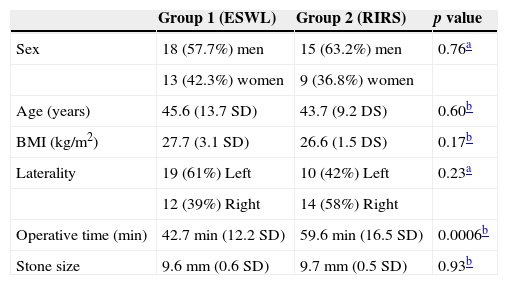Extracorporeal Shock Wave Lithotripsy (ESWL) is currently the recommended treatment for intra-renal calculi smaller than 2cm. However the low Stone Free Rate (SFR) in lower pole calculi gives rise to new techniques, such us retrograde intrarenal surgery (RIRS), for improve the surgery outcomes.
ObjectiveTo compare the efficacy of a treatment with ESWL with RIRS, in terms of SFR after surgery, in patients with kidney stones up to 15mm in the lower pole.
Materials and methodsA prospective study was carried out in order to assess the results of ESWL and RIRS in patients with lower pole stones less than 15mm. Among a total of 55 patients, 31 were underwent to ESWL (Group 1) and the remaining 24 to RIRS (Group 2). Clinical data recorded, including general characteristics of each patient, were: calculi size, side, operative time, complications according to Clavien scale, SFR and the presence of residual fragments at 2 months post-treatment assessed by a CT scan. STATA 11 was used to perform the statistical analysis.
ResultsThere were no differences for general descriptors among groups with the exception of a significantly longer operative time for RIRS. The rates of SFR and residual fragments lesser than 3mm were lower in the RIRS group than in ESWL ones. RIRS also showed a lower rate of clinically significant fragments (0% versus 42.3%. p<0.05). In the subgroup of patients with stones between 10 and 15mm RIRS showed higher SFR (75% versus 41.2%) and a lower rate of stones>3mm (0% versus 58.8%), being statistically significant (p<0.05). Clavien III or higher complications were not reported in any of the groups.
ConclusionsIn the treatment of lower pole stone RIRS has the same results than ESWL in terms of SFR. Regarding absence of a clinically significant residual fragment, RIRS was superior to ESWL. A bigger sample size is required in order to confirm this result.
La litrotricia extracorpórea (LEC) es el tratamiento más recomendado para la litiasis renal menor de 2cm. Sin embargo, las bajas tasas libre de cálculos (SFR) en litiasis de polo renal inferior hace plantear nuevas técnicas que ofrezcan mejores resultados, como la cirugía intrarrenal retrógrada (CRIR).
ObjetivoComparar la eficacia del tratamiento con LEC vs la CRIR en términos de SFR postratamiento en pacientes con litiasis renal de polo inferior de menos de 15mm.
Material y métodosSe realizó un estudio prospectivo aleatorizado para evaluar los resultados de LEC y CRIR en pacientes portadores de litiasis renal de polo inferior menor a 15mm. De un total de 55 pacientes en 31 se realizaron LEC (grupo 1) y 24 CRIR (grupo 2). Se evaluó el tamaño de la litiasis, lateralidad, tiempo operatorio, complicaciones de las técnicas según escala de Clavien, SFR y litiasis residuales a los 2 meses evaluado por tomografía computarizada de abdomen y pelvis sin contraste. Se realizó análisis estadístico para comparar las variables utilizando el programa Stata 11.
ResultadosLos grupos no mostraron diferencias significativas en sus características generales, a excepción del tiempo operatorio (mayor para CRIR). CRIR mostró tener mayor proporción de SFR y de litiasis menor de 3mm. Además CRIR mostró menor tasa de litiasis clínicamente significativa, siendo esta asociación estadísticamente significativa (0% vs 42,3%; p<0,05). En el subgrupo de pacientes con litiasis entre 10 y 15mm CRIR presento mayor SFR (75% vs 41,2%) y menor tasa de litiasis clínicamente significativa (0% vs 58,8%), alcanzando significación estadística (valor de p<0,05). No se registraron complicaciones perioperatorias Clavien III o mayores para ambas técnicas.
ConclusionesEn el tratamiento de litiasis de polo inferior CRIR mostró globalmente resultados de SFR similares a LEC y una menor tasa de litiasis residual clínicamente significativa, más aún en el subgrupo de pacientes con litiasis entre 10 y 15mm, que mostró mejor SFR y mejor tasa de litiasis residual clínicamente significativa. Se requiere un mayor tamaño muestral para confirmar este resultado.
Artículo
Comprando el artículo el PDF del mismo podrá ser descargado
Precio 19,34 €
Comprar ahora










